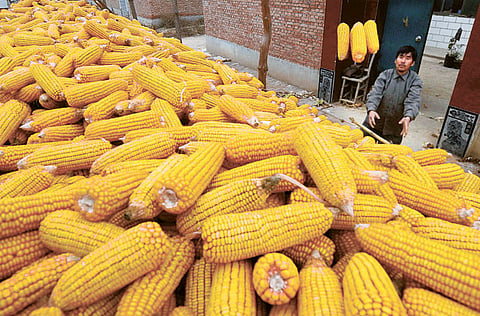In Theory: GCC grain storage facility on cards
Global financial sector driven via commodities, including food

It seems that the global financial sector is still being driven by those who maximise their wealth through manipulation of derivatives and speculations in stock markets — trading in commodities, including food.
Global commodity prices have seen such sharp fluctuations recently, and making money out of these changes would be understandable if it was to related precious commodities, such as gold and oil, but is less so when investors are capitalising on material related to people's daily lives and health.
For example, while corn prices have doubled recently due to the use of corn by-products in producing bio-fuel — a reason that seems logical — the rise in wheat prices is less so. There appears to be no logical reason for the spike in prices except that the global financial community is maximising its profits by trading on the commodity.
The reasons and causes behind climbing food prices are usually well promoted by the media, enabling people to understand why they are occurring. The price of coffee, for example, has doubled recently, leading some observers to refer to it as "black gold," a moniker more commonly used to refer to oil. The price of coffee is further likely to rise by 90 per cent by 2014.
But these high prices are understandable, given that consumption of coffee in China and India has risen along with rising growth rates and an improvement of living standards. Chinese and Indian consumers are abandoning tea and moving to coffee, which is seen as a high-class drink as opposed to tea, seen by some as the drink of the poor.
UAE situation
As for the Middle East, the UAE, which stands out as a leading trade centre in the region, has become the fifth biggest importer of coffee in the world, exceeding the more densely-populated countries.
Indeed, speculators often take advantage of fluctuating prices of commodities — from wheat to oil and gold to coffee — to satisfy their greed for huge profits, while creating crises which are unreal when compared to the balance of supply and demand in markets. A monopoly or temporary storage of certain commodities can lead to an increase in the price, sometimes as much as doubling it for importers.
The issue of taking an exclusive control of trade in commodities poses a serious challenge to various countries across the world, and especially for countries that rely heavily on its food imports to meet their basic food needs. It has therefore become important to take practical steps to ensure food security.
In light of this we should consider the important decision by the Arab Authority for Agricultural Investment and Development to set up a system for storing three to six months of grain reserves for the GCC countries. A GCC grain storage facility will be most likely be situated in the Port of Fujairah, close to the Strait of Hormuz. It is a popular storage point, because it lies outside the strait, thus avoiding many challenges that may arise in exporting grain and ensuring permanent food supplies for the GCC countries in the face of security conditions in the region.
In another important move, the authority is considering establishing an agricultural land investment company with a starting capital of Dh60 million, in cooperation with GCC investors, to buy land in Egypt, Sudan and Kazakh-stan to cultivate and help secure enough supplies of grain for the storage facilities in Fujairah.
The authority will invite private investors to invest in the project, this despite the fact that the authority was founded by Arab states in the late 1970s, which paves the way for the GCC private sector, and its large financial capabilities, to contribute to the development and ensure food security in the Gulf region.
This is one of the most important approaches to face price fluctuations and monopolies by the world's financial community, but such an approach needs to be supported by more measures to enhance its effectiveness and independence. It can only then help solve one of the major problems raised by speculations and manipulation of commodity prices of goods, including food commodities, in the international markets.
Dr Mohammad Al Asoomi is a UAE economic expert and specialist in economic and social development in the UAE and the GCC countries.



